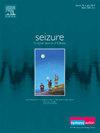“事件观察”是否会改变功能性/分离性癫痫发作患者的心理状态?一项先导随机对照试验”
IF 2.8
3区 医学
Q2 CLINICAL NEUROLOGY
引用次数: 0
摘要
目的功能性/解离性癫痫发作(FDS)是一种类似癫痫或运动障碍的常见疾病,但目前尚无既定的治疗指南。本研究旨在探讨观察个人事件作为一种治疗FDS的新策略的影响。方法单中心、双盲、随机(1:1)对照试验。招募了在癫痫监测单位记录的至少有一次习惯性FDS的患者。所有的参与者都接受了认知行为疗法(CBT),而干预组只展示了他们自己记录的事件。采用标准问卷(HADS和QoLIE-31)测量的心理状态(主要结局)和事件发生频率(次要结局)在随访3个月时进行比较。使用Mann-Whitney U检验来比较两组。进行意向治疗分析。结果72例患者(干预组35例,对照组37例),中位年龄分别为29岁和22岁。干预组的HADS-A中位(IQR)评分[7.0(5.0-8.0)]较对照组[8.0(7.0 - 9.2)]有显著改善,p = 0.026。HADS-D、QoLIE-31评分和事件频率降低的结果无统计学意义。对评分平均变化的分析显示,观看事件后,焦虑评分(Cohen’s d = 0.47)和QoLIE-31总分(Cohen’s d = -0.38)有小到中等效应量的改善。结论在CBT的基础上观察FDS事件记录有助于减轻FDS患者的焦虑症状。本文章由计算机程序翻译,如有差异,请以英文原文为准。
Does ‘event viewing’ alter psychological status in functional/dissociative seizures? A pilot randomised controlled trial”
Objectives
Functional/dissociative seizures (FDS) represent a common disorder that mimics epilepsy or movement disorder, yet there are currently no established treatment guidelines. This study aimed to investigate the impact of viewing one's event as a novel treatment strategy for FDS.
Methods
This was a single-centre, double-blinded, randomised (1:1) controlled trial. Patients with at least one habitual FDS recorded in the epilepsy monitoring unit were recruited. All participants received cognitive behavioural therapy (CBT), while the intervention arm alone was shown their own recorded event. Psychological status (primary outcome), measured using standard questionnaires (HADS and QoLIE-31), and event frequency (secondary outcome) were compared between both groups at 3 months' follow-up. The Mann-Whitney U test was used to compare both arms. Intention-to-treat analysis was performed.
Results
Seventy-two patients (35 in the intervention arm and 37 in the control arm) with a median age of 29 years and 22 years, respectively, were randomised. The median (IQR) HADS-A score showed significant improvement in the intervention arm [7.0 (5.0–8.0)] compared to the control arm [8.0 (7.0–9.2)], p = 0.026. The outcomes on HADS-D, QoLIE-31 scores, and event frequency reduction were not statistically significant. Analysis of mean change in scores showed small to medium effect size improvement in anxiety score (Cohen's d = 0.47) and QoLIE-31 overall score (Cohen's d = -0.38) with event viewing.
Conclusion
Viewing recorded FDS events in addition to CBT may be beneficial in reducing anxiety symptoms in patients with FDS.
求助全文
通过发布文献求助,成功后即可免费获取论文全文。
去求助
来源期刊

Seizure-European Journal of Epilepsy
医学-临床神经学
CiteScore
5.60
自引率
6.70%
发文量
231
审稿时长
34 days
期刊介绍:
Seizure - European Journal of Epilepsy is an international journal owned by Epilepsy Action (the largest member led epilepsy organisation in the UK). It provides a forum for papers on all topics related to epilepsy and seizure disorders.
 求助内容:
求助内容: 应助结果提醒方式:
应助结果提醒方式:


